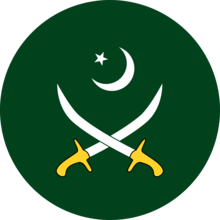Syed Shahid Hamid
Major General Syed Shahid Hamid (Urdu: سید شاہد حامد) HJ (17 September 1910 – 12 March 1993) was the 1st Director-General of Inter-Services Intelligence. A 2 star general in the Pakistan Army and a close associate of President Ayub Khan, he played an instrumental role in bringing Field Marshal Ayub Khan to power in the 1958 coup d'état that overthrew the government of President Major-General Iskander Mirza. Hamid was the first Master General of Ordnance (MGO) of the Pakistan Army. He also authored numerous books, most notably Autobiography of a General.
- Not to be confused with the governor of Punjab, Shahid Hamid.
Syed Shahid Hamid | |
|---|---|
| Birth name | Syed Shahid Hamid |
| Born | 17 September 1910 Lucknow, British India |
| Died | 12 March 1993 (aged 82) Rawalpindi Punjab province, Pakistan |
| Allegiance | |
| Service/ | |
| Years of service | 1934–1964 |
| Rank | |
| Commands held | Master General of Ordnance (MGO) Adjutant-General (AG) Additional DG Inter Services Intelligence DG Military Intelligence |
| Battles/wars | World War II
Indo-Pakistani War of 1947 |
| Awards | Hilal-i-Jurat |
| Relations | Altaf Fatima Syed Rafique Husain Salman Rushdie |
He was the uncle of the Bombay-born British novelist, Salman Rushdie
Early life
Syed Shahid Hamid was born in Lucknow, British India. He went to school at the Colvin Taluqdar school (Lucknow) in 1923 before going to the Aligarh Muslim University, where he received a B.A. and an M.A. in Mathematics.[1] He was accepted into the Royal Military College Sandhurst in 1932. He received a commission onto the Unattached List, Indian Army on 1 February 1934. He arrived in India on 16 February 1934 and was shortly afterwards attached to the 2nd battalion of the Prince of Wales Volunteers (South Lancashire) regiment at Allahbad.[2] On 12 March 1935 he was admitted into the Indian Army and was posted to the 3rd Cavalry at Meerut.[3] His seniority as a Second Lieutenant was later antedated to on 31 August 1933. He was attached to the Royal Indian Army Service Corps in early 1940 and later permanently transferred.[4] He served in Kohat, Fort Sandeman, and Risalpur. He was promoted to Lieutenant on 30 November 1935 and to Captain on 31 August 1941.[5]
Military career
During the Second World War, he fought on the Burmese front, where his eyes were badly injured. He retreated from Rangoon and was evacuated from Shewbo to Calcutta. In 1943, after being declared fit for duty, he became a Senior Instructor at the Command and Staff College in Quetta. Field Marshal Claude Auchinleck appointed Hamid his Private Secretary on 28 March 1946 and Hamid played an influential role in the decision making by Auchinleck.[6] Shahid Hamid was an inside player in the crucial months leading up to the independence of Pakistan in 1947.
Senior appointments
When Pakistan was created, he opted to join the Pakistan Army. As a Lieutenant-Colonel in 1948, he set up the Inter Services Intelligence from a small office in Karachi. He led the military operations in Kashmir in the Indo-Pakistani War of 1947. In 1951, at the age of 41, he became the youngest general in the Pakistan army. In 1958, Hamid became the adjutant-general of the army after playing an important role in bringing Field Marshal Ayub Khan to power. In 1960, he was made the first Master General of Ordnance (MGO) of the army. Hamid retired from the Army in 1964, and was given an honorary discharge. In 1978, he was summoned back to public life by President Zia ul-Haq, and served as a federal cabinet minister for three years.[1]
Post-retirement
Shahid Hamid was deeply interested in education, and helped found and became a patron of the Aligarh Old Boys Association and established Sir Sued School and Sir Syed Science College for boys and girls at Tipu Road, Rawal Pindi]. After traveling across Pakistan's mountainous Northern Areas, he helped open up the region for local people and tourists by supporting road projects and writing books and articles in which he described the beauty of the area.[1] For the last 20 years of his life, he wrote and researched books. He wrote five books on the Northern Areas, the politics of the Pakistan Movement, and the Pakistani army, as well as an autobiography.
References
- Rashid, Ahmed (15 March 1993). "Obituary: Maj-Gen Syed Shahid Hamid". The Independent. Retrieved 23 May 2013.
- Indian Army List January 1935
- Indian Army List January 1936
- Indian Army List April 1940
- Indian Army List's for January 1936 and July 1943
- April 1947 Army List
